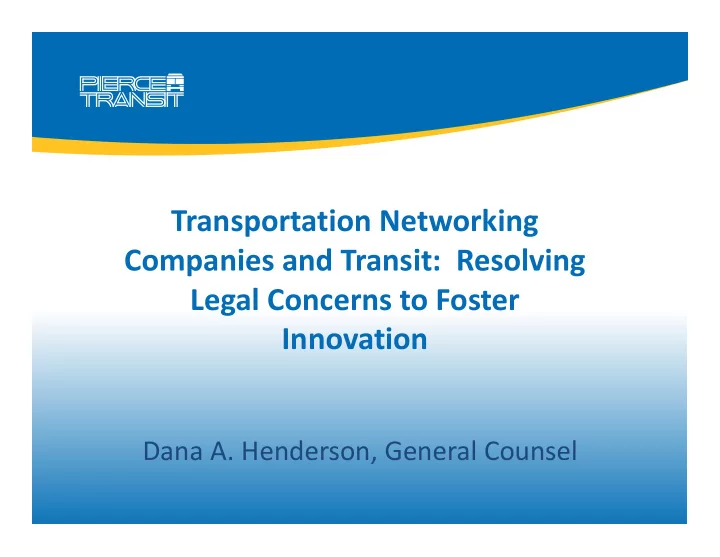

Transportation Networking Companies and Transit: Resolving Legal Concerns to Foster Innovation Dana A. Henderson, General Counsel
Why partner with TNCs? Innovation and continued relevancy • Ease & convenience of rider connections (at lower cost) • Rider expectations • Recent APTA study: 20+% already using TNC in some way to • connect to transit Shared goals, like: • – alternatives to congestion, – Minimizing SOVs, – Service to those who do not have cars, – Ease and affordability of transportation, and – Seamless options. Options outside of usual transit fixed route hours. • At “sweet spot” – environmentally responsible transportation • solution/partner. Continued first and last mile barrier to transit use. •
Risks to address • ADA; Service Animals • Liability/indemnification • Insurance • Public records and data sharing // overall transparency • Labor Unions and employment classification • Public safety: background checks; vehicle inspections; business license; drugs/alcohol • Title VI – disparate impact/disproportionate burden • FTA requirements • Parking/ROW sharing • Signage/advertising • Procurement requirements • Access for non ‐ tech/smart phone users • Regional coordination (separate contracts per agency but overlapping service areas) • Data breach/customer information …and probably more!
ADA accessibility/Equivalency TNCs are subject to ADA requirements Via Transit Agency, must provide “equivalent service” ‐ Service must be accessible; even if individual vehicles not ‐ Some ADA service via TNC is acceptable as long as it meets requirements (complementary paratransit) ‐ If TNC provides fixed route, must be WAV Options: ‐ TNC provides enough WAV vehicles; ‐ additional contract with WAV contractor; or ‐ dispatch your own fleet.
Drug & Alcohol Testing 49 CFR 655 ‐ D&A requirements applicable to independent drivers of ridesharing companies contracting with transit agencies. But: ‐ “taxicab exemption” ‐ not when patron chooses company that provides service (voucher) ‐ not if funded by research funds ‐ not pilot programs
FTA Sandbox Grant Recipients w/ TNCs
Different Models Coupons/discounts: Using TNCs within zones and if begin/end at a stop or transit center, • $X off of trip. Associated on ‐ demand option for paratransit. (PSTA; Denton Cty; San Diego MTS) Shared or Hosted Marketing: Advertising an official “ride share partner” w/ discounts • (Chicago Metra); allowing for discounted TNC rides in exchange for advertising space on transit facilities or fleet (SEPTA) App Integration: Transit as an option on the TNC’s app/information sharing “complete • trip” (DART); partnering with TNC on TransLoc Rider mobile app (Memphis ATA; Go Triangle); “Bus Detective” (SORTA) Partnering with TNCs for limited services: ERH, special event connections • Micro Transit – either provided by private carrier or run on App by Transit Agency (Valley • Transit; KC Transit)
Thank you Dana Henderson Pierce Transit Lakewood, Washington (253) 777 ‐ 4977 dhenderson@piercetransit.org
Recommend
More recommend